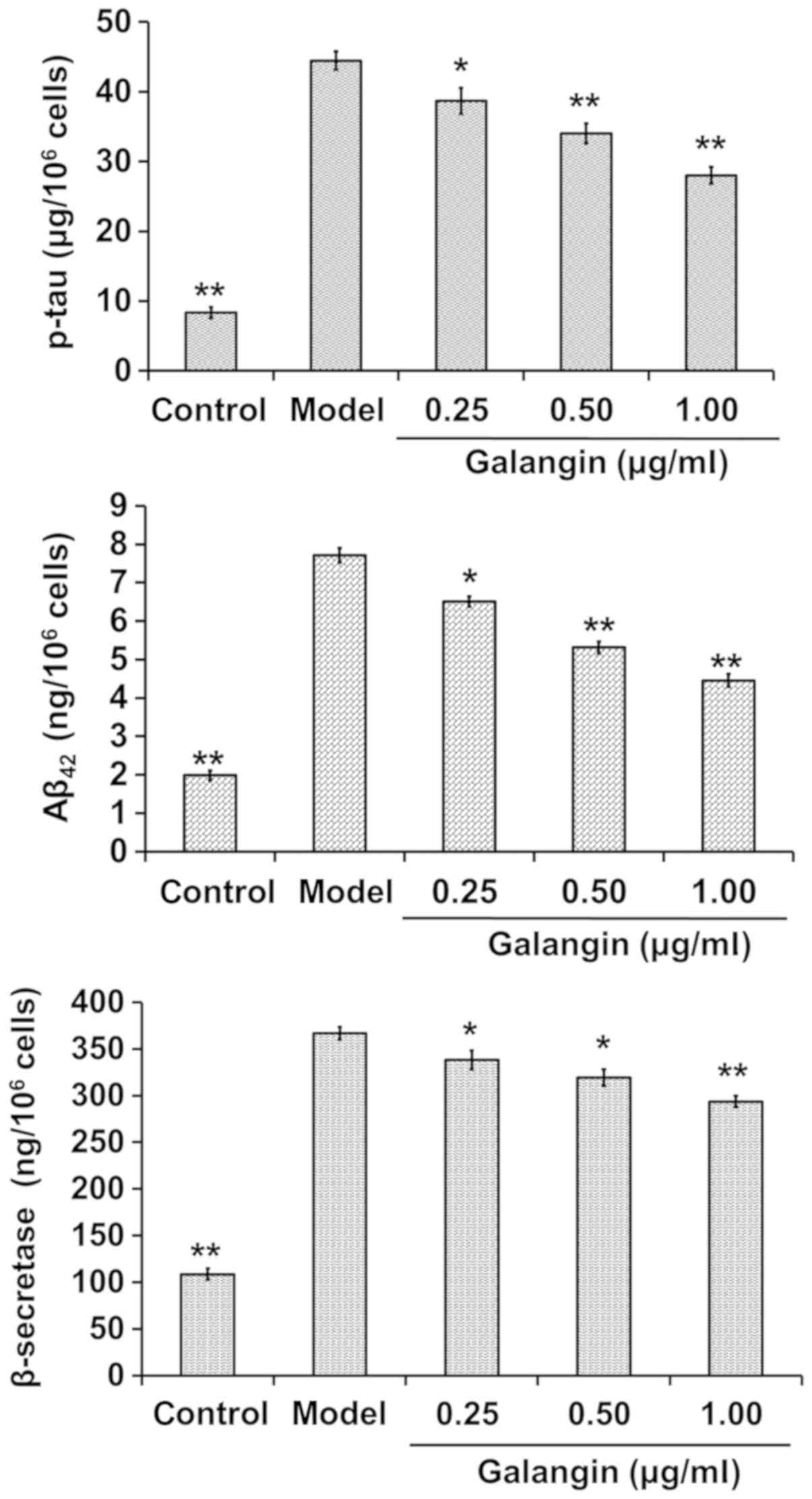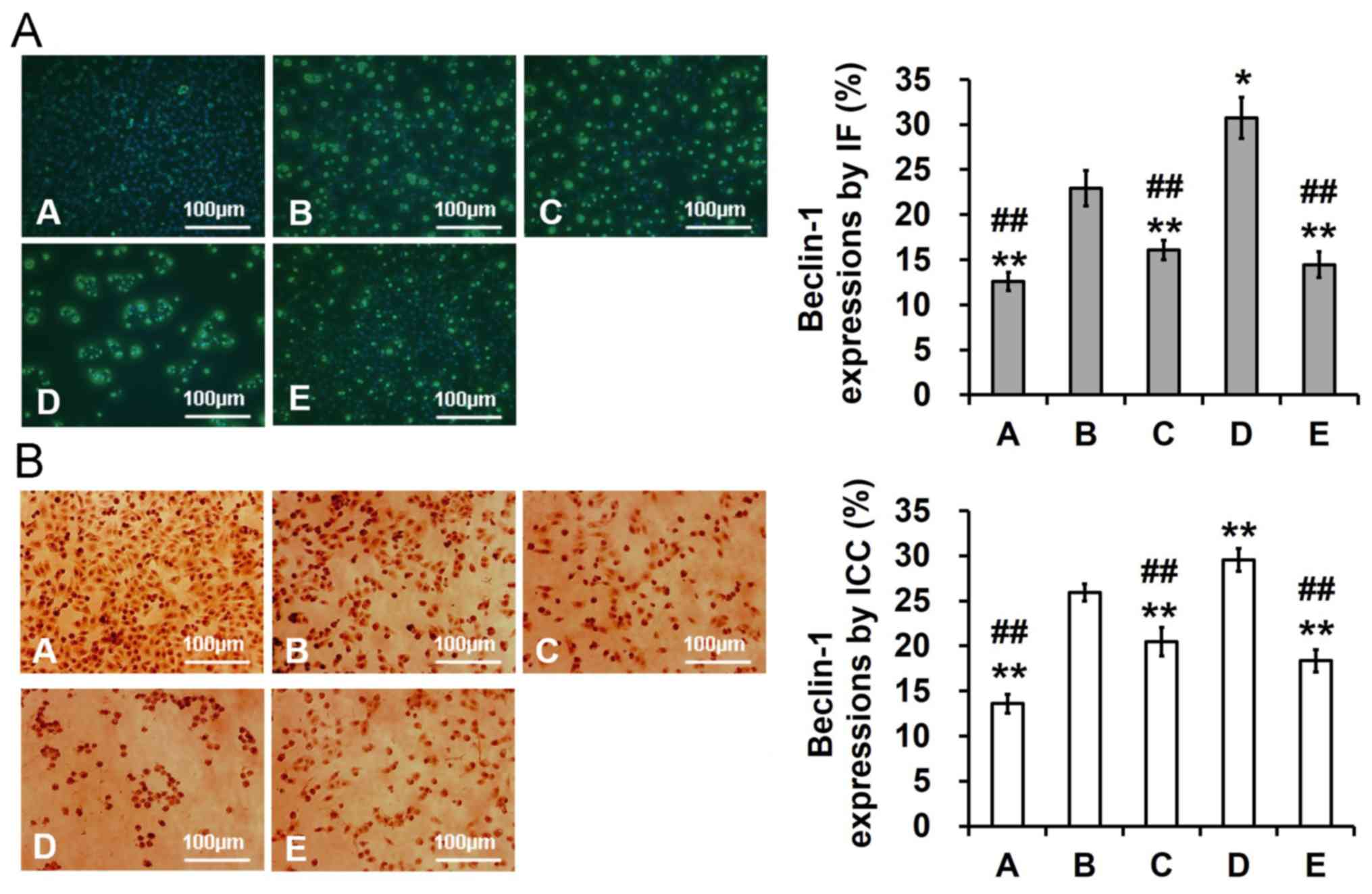|
1
|
Swomley AM, Förster S, Keeney JT, Triplett
J, Zhang Z, Sultana R and Butterfield DA: Abeta, oxidative stress
in Alzheimer disease: Evidence based on proteomics studies. Biochim
Biophys Acta 1842. 1248–1257. 2014.
|
|
2
|
Guerreiro RJ, Gustafson DR and Hardy J:
The genetic architecture of Alzheimer's disease: Beyond APP, PSENs
and APOE. Neurobiol Aging. 33:437–456. 2012. View Article : Google Scholar : PubMed/NCBI
|
|
3
|
Yen CH, Wang CH, Wu WT and Chen HL:
Fructo-oligosaccharide improved brain β-amyloid, β-secretase,
cognitive function, and plasma antioxidant levels in
D-galactose-treated Balb/cJ mice. Nutr Neurosci. 20:228–237. 2017.
View Article : Google Scholar : PubMed/NCBI
|
|
4
|
Wolfe MS: Processive proteolysis by
γ-secretase and the mechanism of Alzheimer's disease. Biol Chem.
393:899–905. 2012. View Article : Google Scholar : PubMed/NCBI
|
|
5
|
Imbimbo BP and Giardina GA: γ-secretase
inhibitors and modulators for the treatment of Alzheimer's disease:
Disappointments and hopes. Curr Top Med Chem. 11:1555–1570. 2011.
View Article : Google Scholar : PubMed/NCBI
|
|
6
|
Wang X, Gong G, Yang W, Li Y, Jiang M and
Li L: Antifibrotic activity of galangin, a novel function evaluated
in animal liver fibrosis model. Environ Toxicol Pharmacol.
36:288–295. 2013. View Article : Google Scholar : PubMed/NCBI
|
|
7
|
Huh JE, Jung IT, Choi J, Baek YH, Lee JD,
Park DS and Choi DY: The natural flavonoid galangin inhibits
osteoclastic bone destruction and osteoclastogenesis by suppressing
NF-κB in collagen-induced arthritis and bone marrow-derived
macrophages. Eur J Pharmacol. 698:57–66. 2013. View Article : Google Scholar : PubMed/NCBI
|
|
8
|
Zeng H, Huang P, Wang X, Wu J, Wu M and
Huang J: Galangin-induced down-regulation of BACE1 by epigenetic
mechanisms in SH-SY5Y cells. Neuroscience. 294:172–181. 2015.
View Article : Google Scholar : PubMed/NCBI
|
|
9
|
Penke B, Bogár F and Fülöp L: Protein
folding and misfolding, endoplasmic reticulum stress in
neurodegenerative diseases: In trace of novel drug targets. Curr
Protein Pept Sci. 17:169–182. 2016. View Article : Google Scholar : PubMed/NCBI
|
|
10
|
Viola KL and Klein WL: Amyloid β oligomers
in Alzheimer's disease pathogenesis, treatment, and diagnosis. Acta
Neuropathol. 129:183–206. 2015. View Article : Google Scholar : PubMed/NCBI
|
|
11
|
Guo JL and Lee VM: Seeding of normal Tau
by pathological Tau conformers drives pathogenesis of
Alzheimer-like tangles. J Biol Chem. 286:15317–15331. 2011.
View Article : Google Scholar : PubMed/NCBI
|
|
12
|
Pickford F, Masliah E, Britschgi M, Lucin
K, Narasimhan R, Jaeger PA, Small S, Spencer B, Rockenstein E,
Levine B and Wyss-Coray T: The autophagy-related protein beclin 1
shows reduced expression in early Alzheimer disease and regulates
amyloid beta accumulation in mice. J Clin Invest. 118:2190–2199.
2008.PubMed/NCBI
|
|
13
|
Lipinski MM, Zheng B, Lu T, Yan Z, Py BF,
Ng A, Xavier RJ, Li C, Yankner BA, Scherzer CR and Yuan J:
Genome-wide analysis reveals mechanisms modulating autophagy in
normal brain aging and in Alzheimer's disease. Proc Natl Acad Sci
USA. 107:14164–14169. 2010. View Article : Google Scholar : PubMed/NCBI
|
|
14
|
Kamat PK and Nath C: Okadaic acid: A tool
to study regulatory mechanisms for neurodegeneration and
regeneration in Alzheimer's disease. Neural Regen Res. 10:365–367.
2015. View Article : Google Scholar : PubMed/NCBI
|
|
15
|
Li Q, Liu Y and Sun M: Autophagy and
Alzheimer's disease. Cell Mol Neurobiol. 37:377–388. 2017.
View Article : Google Scholar : PubMed/NCBI
|
|
16
|
Salminen A, Kaarniranta K, Kauppinen A,
Ojala J, Haapasalo A, Soininen H and Hiltunen M: Impaired autophagy
and APP processing in Alzheimer's disease: The potential role of
Beclin 1 interactome. Prog Neurobiol. 106-107:33–54. 2013.
View Article : Google Scholar : PubMed/NCBI
|
|
17
|
Li RC, Pouranfar F, Lee SK, Morris MW,
Wang Y and Gozal D: Neuroglobin protects PC12 cells against
beta-amyloid-induced cell injury. Neurobiol Aging. 29:1815–1822.
2008. View Article : Google Scholar : PubMed/NCBI
|
|
18
|
Chen Y, McMillan-Ward E, Kong J, Israels
SJ and Gibson SB: Oxidative stress induces autophagic cell death
independent of apoptosis in transformed and cancer cells. Cell
Death Differ. 15:171–182. 2008. View Article : Google Scholar : PubMed/NCBI
|
|
19
|
Wang H, Ma J, Tan Y, Wang Z, Sheng C, Chen
S and Ding J: Amyloid-beta1-42 induces reactive oxygen
species-mediated autophagic cell death in U87 and SH-SY5Y cells. J
Alzheimers Dis. 21:597–610. 2010. View Article : Google Scholar : PubMed/NCBI
|
|
20
|
Cataldo AM, Petanceska S, Terio NB,
Peterhoff CM, Durham R, Mercken M, Mehta PD, Buxbaum J, Haroutunian
V and Nixon RA: Abeta localization in abnormal endosomes:
Association with earliest Abeta elevations in AD and Down syndrome.
Neurobiol Aging. 25:1263–1272. 2004. View Article : Google Scholar : PubMed/NCBI
|
|
21
|
LaFerla FM, Green KN and Oddo S:
Intracellular amyloid-beta in Alzheimer's disease. Nat Rev
Neurosci. 8:499–509. 2007. View
Article : Google Scholar : PubMed/NCBI
|
|
22
|
Choy RW, Cheng Z and Schekman R: Amyloid
precursor protein (APP) traffics from the cell surface via
endosomes for amyloid β (Aβ) production in the trans-Golgi network.
Proc Natl Acad Sci USA. 109:E2077–E2082. 2012. View Article : Google Scholar : PubMed/NCBI
|
|
23
|
Omata Y, Lim YM, Akao Y and Tsuda L:
Age-induced reduction of autophagy-related gene expression is
associated with onset of Alzheimer's disease. Am J Neurodegener
Dis. 3:134–142. 2014.PubMed/NCBI
|
|
24
|
Kim YD, Jeong EI, Nah J, Yoo SM, Lee WJ,
Kim Y, Moon S, Hong SH and Jung YK: Pimozide reduces toxic forms of
tau in TauC3 mice via 5′ adenosine monophosphate-activated protein
kinase-mediated autophagy. J Neurochem. 142:734–746. 2017.
View Article : Google Scholar : PubMed/NCBI
|
|
25
|
Cakir M, Duzova H, Tekin S, Taslıdere E,
Kaya GB, Cigremis Y, Ozgocer T and Yologlu S: ACA, an inhibitor
phospholipases A2 and transient receptor potential melastatin-2
channels, attenuates okadaic acid induced neurodegeneration in
rats. Life Sci. 176:10–20. 2017. View Article : Google Scholar : PubMed/NCBI
|
|
26
|
Wu X, Kosaraju J and Tam KY: SLM, a novel
carbazole-based fluorophore attenuates okadaic acid-induced tau
hyperphosphorylation via down-regulating GSK-3β activity in SH-SY5Y
cells. Eur J Pharm Sci. 110:101–108. 2017. View Article : Google Scholar : PubMed/NCBI
|
|
27
|
Zhang J, Cheng Y and Zhang JT: Protective
effect of (−) clausenamide against neurotoxicity induced by okadaic
acid and beta-amyloid peptide25-3. Yao Xue Xue Bao. 42:935–942.
2007.(In Chinese). PubMed/NCBI
|
|
28
|
Kamat PK, Rai S and Nath C: Okadaic acid
induced neurotoxicity: An emerging tool to study Alzheimer's
disease pathology. Neurotoxicology. 37:163–172. 2013. View Article : Google Scholar : PubMed/NCBI
|
|
29
|
Zhao XJ, Gong DM, Jiang YR, Guo D, Zhu Y
and Deng YC: Multipotent AChE and BACE-1 inhibitors for the
treatment of Alzheimer's disease: Design, synthesis and
bio-analysis of 7-amino-1,4-dihydro-2H-isoquilin-3-one derivates.
Eur J Med Chem. 138:738–747. 2017. View Article : Google Scholar : PubMed/NCBI
|
|
30
|
Yang CC, Kuai XX, Gao WB, Yu JC, Wang Q,
Li L and Zhang L: Morroniside-induced PP2A activation antagonizes
Tau hyperphosphorylation in a cellular model of neurodegeneration.
J Alzheimers Dis. 51:33–44. 2016. View Article : Google Scholar : PubMed/NCBI
|
|
31
|
Aminyavari S, Zahmatkesh M, Farahmandfar
M, Khodagholi F, Dargahi L and Zarrindast MR: Protective role of
Apelin-13 on amyloid β25-35-induced memory deficit; Involvement of
autophagy and apoptosis process. Prog Neuropsychopharmacol Biol
Psychiatry. 89:322–334. 2019. View Article : Google Scholar : PubMed/NCBI
|
|
32
|
Yu J, Lan L, Lewin SJ, Rogers SA, Roy A,
Wu X, Gao P, Karanicolas J, Aubé J, Sun B and Xu L: Identification
of novel small molecule Beclin 1 mimetics activating autophagy.
Oncotarget. 8:51355–51369. 2017.PubMed/NCBI
|
|
33
|
Jaeger PA, Pickford F, Sun CH, Lucin KM,
Masliah E and Wyss-Coray T: Regulation of amyloid precursor protein
processing by the Beclin 1 complex. PLoS One. 5:e111022010.
View Article : Google Scholar : PubMed/NCBI
|
|
34
|
Hotfilder M, Sondermann P, Senss A, van
Valen F, Jürgens H and Vormoor J: PI3K/AKT is involved in mediating
survival signals that rescue Ewing tumour cells from fibroblast
growth factor 2-induced cell death. Br J Cancer. 92:705–710. 2005.
View Article : Google Scholar : PubMed/NCBI
|
|
35
|
Du C, Zhang T, Xiao X, Shi Y, Duan H and
Ren Y: Protease-Activated Receptor-2 promotes kidney tubular
epithelial inflammation by inhibiting autophagy via the
PI3K/Akt/mTOR signalling pathway. Biochem J. 474:2733–2747. 2017.
View Article : Google Scholar : PubMed/NCBI
|
|
36
|
Ma T, Tzavaras N, Tsokas P, Landau EM and
Blitzer RD: Synaptic stimulation of mTOR is mediated by Wnt
signaling and regulation of glycogen synthetase kinase-3. J
Neurosci. 31:17537–17546. 2011. View Article : Google Scholar : PubMed/NCBI
|
|
37
|
Yang S, Chen Z, Cao M, Li R, Wang Z and
Zhang M: Pioglitazone ameliorates Aβ42 deposition in rats with
diet-induced insulin resistance associated with AKT/GSK3β
activation. Mol Med Rep. 15:2588–2594. 2017. View Article : Google Scholar : PubMed/NCBI
|



















